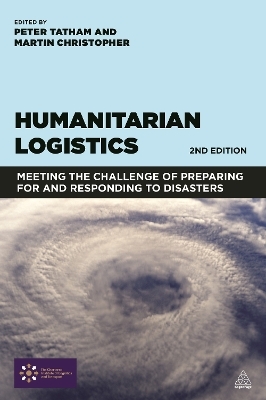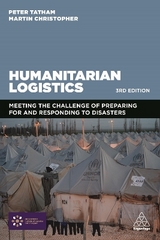
Humanitarian Logistics
Kogan Page Ltd (Verlag)
978-0-7494-7087-6 (ISBN)
- Titel erscheint in neuer Auflage
- Artikel merken
A range of recent disasters have demonstrated the critical role of effective logistics in disaster preparation and response in both developing and developed countries.
Humanitarian Logistics provides thought provoking guidance and discussion of the core issues facing those who are involved in managing the logistics of disaster relief. Peter Tatham and Martin Christopher have assembled a broad ranging collection of thoughts, ideas, concepts and approaches contributed by both practitioners and academics that, together, provide an overview of some of the core challenges facing today's humanitarian logistician. With insights from world leading experts in the field, this multi-contributed book provides guidance for best practice and offers potential solutions for effective response in this crucial area.
Each chapter of the 2nd edition has been updated to reflect the latest developments, improvements and emerging challenges that have been encountered in this important and rapidly-growing field. This new edition of Humanitarian Logistics also increases the level of input from the practitioner community and broadens the geographic coverage, by introducing new perspectives from Asia and Africa and a number of experienced field practitioners.
There are also entire new chapters on: Quality and accountability; Lessons learned from the 2004 Thailand Tsunami and the April 2012 Tsunami warning; Emergency preparedness and the experience of international humanitarian organizations in South East Asia; What next for humanitarian logistics? It also includes chapters that focus on emerging areas of challenge that have attracted recent attention in both practitioner and academic circles, including training and education, inter-agency coordination and information systems management.
Professor Peter Tatham is a leading international researcher in the field of humanitarian logistics, and is the Deputy Head of the Department of International Business and Asian Studies at Griffith Business School, Queensland, Australia. Professor Martin Christopher has worked in logistics education and research for forty years and previously headed the department of Demand Chain Management for Cranfield University.
Chapter - 00: Introduction – Peter Tatham and Martin Christopher;
Chapter - 01: An improvement process for process improvement: quality and accountability in humanitarian logistics – Paul Larson;
Chapter - 02: Impacts of funding systems on humanitarian operations – Tina Wakolbinger and Fuminori Toyasaki;
Chapter - 03: Information technology in humanitarian supply chains – Martijn Blansjaar and Fraser Stephens;
Chapter - 04: Cracking the humanitarian logistic coordination challenge: some pointers from the International Search and Rescue Advisory Group and the Foreign Medical Teams – Peter Tatham and Karen Spens;
Chapter - 05: Humanitarian logistics and the cluster approach: global shifts and the US perspective – Nezih Altay and Melissa Labonte;
Chapter - 06: The increasing importance of services in humanitarian logistics – Graham Heaslip;
Chapter - 07: The 2004 Thailand tsunami and the April 2012 tsunami warning: were lessons learned? – Stephen Pettit, Anthony Beresford, Michael Whiting, Ruth Banomyong and Sylvie Beresford;
Chapter - 08: The journey to humanitarian supply network management: an African perspective – Paul Buatsi and Charles Mbohwa;
Chapter - 09: Emergency preparedness: experience of international humanitarian organizations in Southeast Asia – Qing Lu, Mark Goh and Robert de Souza;
Chapter - 10: Humanitarian logistics professionalism – David Moore, Dorothea Carvalho and David Taylor;
Chapter - 11: What next for humanitarian logistics? – George Fenton, Mike Goodhand and Rebecca Vince;
Chapter - 12: The impossible interface? Combining humanitarian logistics and military supply chain capabilities – Jersey Seipel and Graham Heaslip;
Chapter - 13: Disaster agencies and military forces: not such strange bedfellows after all! – Tim Cross;
Chapter - 14: Where next? The future of humanitarian logistics – Gyöngyi Kovács
| Erscheint lt. Verlag | 3.10.2014 |
|---|---|
| Verlagsort | London |
| Sprache | englisch |
| Maße | 155 x 235 mm |
| Gewicht | 500 g |
| Themenwelt | Sozialwissenschaften ► Soziologie |
| Wirtschaft ► Betriebswirtschaft / Management ► Logistik / Produktion | |
| Wirtschaft ► Betriebswirtschaft / Management ► Marketing / Vertrieb | |
| Wirtschaft ► Betriebswirtschaft / Management ► Unternehmensführung / Management | |
| ISBN-10 | 0-7494-7087-9 / 0749470879 |
| ISBN-13 | 978-0-7494-7087-6 / 9780749470876 |
| Zustand | Neuware |
| Haben Sie eine Frage zum Produkt? |
aus dem Bereich



